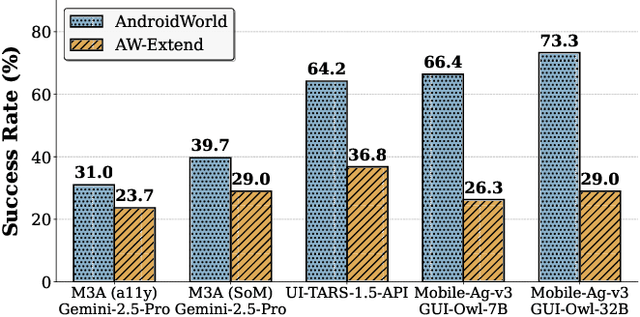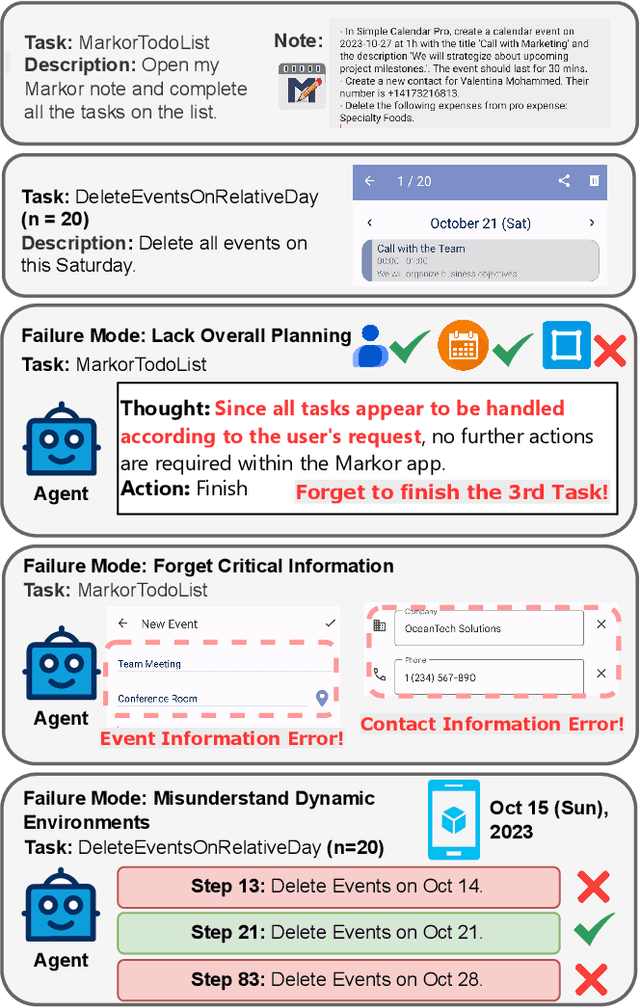Shanhui Zhao
AgentProg: Empowering Long-Horizon GUI Agents with Program-Guided Context Management
Dec 11, 2025



Abstract:The rapid development of mobile GUI agents has stimulated growing research interest in long-horizon task automation. However, building agents for these tasks faces a critical bottleneck: the reliance on ever-expanding interaction history incurs substantial context overhead. Existing context management and compression techniques often fail to preserve vital semantic information, leading to degraded task performance. We propose AgentProg, a program-guided approach for agent context management that reframes the interaction history as a program with variables and control flow. By organizing information according to the structure of program, this structure provides a principled mechanism to determine which information should be retained and which can be discarded. We further integrate a global belief state mechanism inspired by Belief MDP framework to handle partial observability and adapt to unexpected environmental changes. Experiments on AndroidWorld and our extended long-horizon task suite demonstrate that AgentProg has achieved the state-of-the-art success rates on these benchmarks. More importantly, it maintains robust performance on long-horizon tasks while baseline methods experience catastrophic degradation. Our system is open-sourced at https://github.com/MobileLLM/AgentProg.
LLM-Explorer: Towards Efficient and Affordable LLM-based Exploration for Mobile Apps
May 15, 2025Abstract:Large language models (LLMs) have opened new opportunities for automated mobile app exploration, an important and challenging problem that used to suffer from the difficulty of generating meaningful UI interactions. However, existing LLM-based exploration approaches rely heavily on LLMs to generate actions in almost every step, leading to a huge cost of token fees and computational resources. We argue that such extensive usage of LLMs is neither necessary nor effective, since many actions during exploration do not require, or may even be biased by the abilities of LLMs. Further, based on the insight that a precise and compact knowledge plays the central role for effective exploration, we introduce LLM-Explorer, a new exploration agent designed for efficiency and affordability. LLM-Explorer uses LLMs primarily for maintaining the knowledge instead of generating actions, and knowledge is used to guide action generation in a LLM-less manner. Based on a comparison with 5 strong baselines on 20 typical apps, LLM-Explorer was able to achieve the fastest and highest coverage among all automated app explorers, with over 148x lower cost than the state-of-the-art LLM-based approach.
AutoDroid-V2: Boosting SLM-based GUI Agents via Code Generation
Dec 24, 2024



Abstract:Large language models (LLMs) have brought exciting new advances to mobile UI agents, a long-standing research field that aims to complete arbitrary natural language tasks through mobile UI interactions. However, existing UI agents usually demand high reasoning capabilities of powerful large models that are difficult to be deployed locally on end-users' devices, which raises huge concerns about user privacy and centralized serving cost. One way to reduce the required model size is to customize a smaller domain-specific model with high-quality training data, e.g. large-scale human demonstrations of diverse types of apps and tasks, while such datasets are extremely difficult to obtain. Inspired by the remarkable coding abilities of recent small language models (SLMs), we propose to convert the UI task automation problem to a code generation problem, which can be effectively solved by an on-device SLM and efficiently executed with an on-device code interpreter. Unlike normal coding tasks that can be extensively pretrained with public datasets, generating UI automation code is challenging due to the diversity, complexity, and variability of target apps. Therefore, we adopt a document-centered approach that automatically builds fine-grained API documentation for each app and generates diverse task samples based on this documentation. By guiding the agent with the synthetic documents and task samples, it learns to generate precise and efficient scripts to complete unseen tasks. Based on detailed comparisons with state-of-the-art mobile UI agents, our approach effectively improves the mobile task automation with significantly higher success rates and lower latency/token consumption. Code will be open-sourced.
Empowering LLM to use Smartphone for Intelligent Task Automation
Sep 09, 2023Abstract:Mobile task automation is an attractive technique that aims to enable voice-based hands-free user interaction with smartphones. However, existing approaches suffer from poor scalability due to the limited language understanding ability and the non-trivial manual efforts required from developers or end-users. The recent advance of large language models (LLMs) in language understanding and reasoning inspires us to rethink the problem from a model-centric perspective, where task preparation, comprehension, and execution are handled by a unified language model. In this work, we introduce AutoDroid, a mobile task automation system that can handle arbitrary tasks on any Android application without manual efforts. The key insight is to combine the commonsense knowledge of LLMs and domain-specific knowledge of apps through automated dynamic analysis. The main components include a functionality-aware UI representation method that bridges the UI with the LLM, exploration-based memory injection techniques that augment the app-specific domain knowledge of LLM, and a multi-granularity query optimization module that reduces the cost of model inference. We integrate AutoDroid with off-the-shelf LLMs including online GPT-4/GPT-3.5 and on-device Vicuna, and evaluate its performance on a new benchmark for memory-augmented Android task automation with 158 common tasks. The results demonstrated that AutoDroid is able to precisely generate actions with an accuracy of 90.9%, and complete tasks with a success rate of 71.3%, outperforming the GPT-4-powered baselines by 36.4% and 39.7%. The demo, benchmark suites, and source code of AutoDroid will be released at url{https://autodroid-sys.github.io/}.
 Add to Chrome
Add to Chrome Add to Firefox
Add to Firefox Add to Edge
Add to Edge